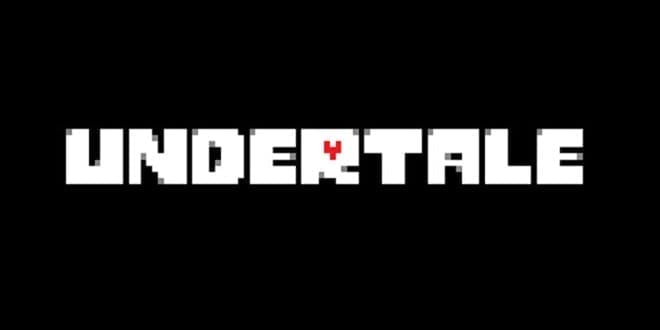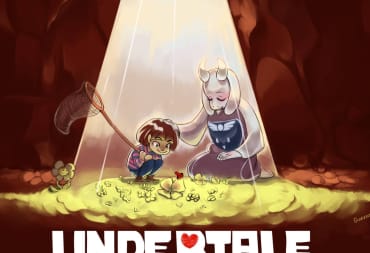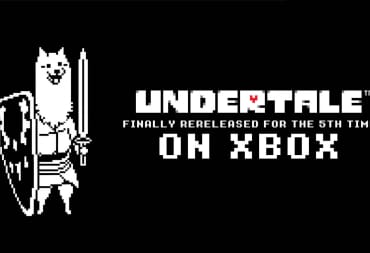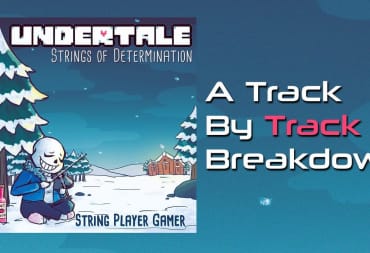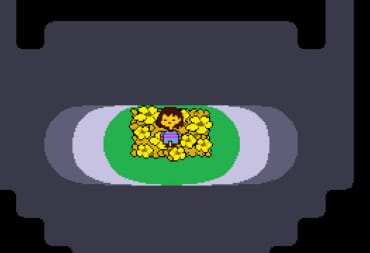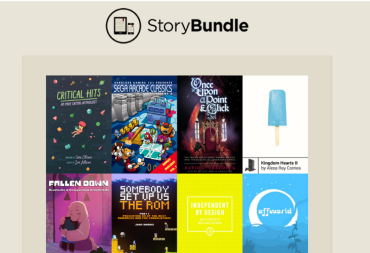I have spent countless hours wandering a bombed-out wasteland in Fallout, venturing to alien facilities in Halo, and warring with dragons in Skyrim. Each of those worlds are fondly remembered, but they are nothing compared to the feelings I have for the world I only recently visited for a dozen hours. The world of Undertale feels instantly familiar and comfortable, filled with characters that are friendly and relatable in a way that most game’s characters couldn’t dream of being. At the end of my journey, I felt that I had made real connections with these figures, I knew their ins and outs, and I felt joyous for helping them achieve their dreams. That is the magic of Undertale, a comedic JRPG that defies expectations at every turn and makes even the most jaded of players transcend into its fiction.
In a time before time, an ancient race of humans warred with the monsters that plagued their land. Humans were victorious and sealed away their foes underground, never to be heard from again. You play as a small child that has fallen into the underground world of monsters, and your actions in this place will determine their future. From there, Undertale does a great job of shaping its narrative based on what the player wants to do. In addition to a turn-based battle system, you can talk to your enemies, spare them if they've been weakened, or even just attempt to run away. All of these have a significant effect on your progress, and each of the game's random encounters feel unique thanks to this setup.
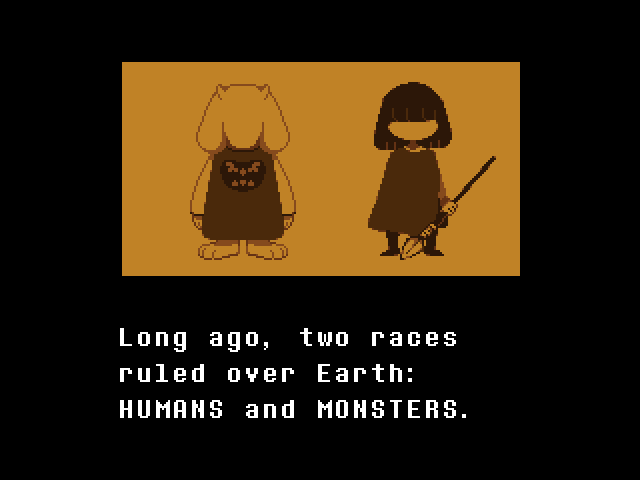
Undertale’s combat system is unique both in its function and its meaning. When you choose to fight, you play a timing-based mini-game, much like older golf titles. Hit the middle, and you mash on the button to do the most damage. Enemy attacks are realized as obstacles that you must avoid, much like a shoot-em-up. You have a heart that represents your health, and you must dodge the attacks in a box of varying size. In addition, each enemy's attacks are completely different and themed to their personality, meaning that you'll never see the same pattern used by different enemies. A sentient vegetable might shoot carrots and tomatoes at you, while a musclebound seahorse might just flex its muscles over and over.
Encounters can go from simplistic all the way to bullet hell nightmares depending on who you’re facing. There are also times when the enemy doesn’t feel like fighting, and during this dialogue, their attacks might lose some speed or actively avoid you entirely. In this way, every combat encounter matters to the overall narrative, and your choices in dealing with the creatures in your way are just as important as the choices you make in dialogue.
Subverting combat is just the first trick that Undertale has in store for unknowing players. Much like Portal 2 and its hidden, long-winded conversations with Wheatley, this game is full of hidden areas and comedic dialogue specific to certain situations. Discovering these character moments and world-building secrets are some of the best parts of the game, revealing a developer who understands interactivity should be above all else in game design. There are a few obscure things that require some doing, but most secrets are hinted at enough to allow a player to find them through normal play. There are no throwaway NPCs in Undertale; every part of the game has something to offer, and exploration is rewarded highly.
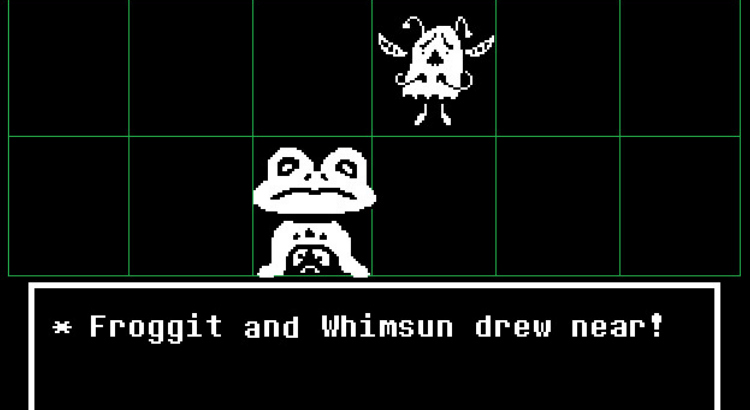
There has been a short demo of Undertale available for years now, and one of the most impressive things about that was its extensive soundtrack. There were fifteen unique tracks in that demo, and in the full game, this has been expanded to seventy-seven compositions. Not since Shovel Knight have I wanted to listen to chiptune music outside of its game of origin, but Undertale's battle themes and town jingles stick with you. Listening after it's all over, I get nostalgic for the specific events the music was paired with, which is not something I've experienced before with any game's soundtrack.
If there is one thing you might have heard about Undertale, it's that you don't want to spoil yourself, and I wholeheartedly agree. I admit that it would be hard to spoil everything in one fell swoop, but Undertale's narrative is most effective when a player goes with their own gut instincts and lets the game lead you along to one conclusion or the next. Don't seek out screenshots, don't ask for explanations or solutions from players that have already completed the game, just go and enjoy. There are several endings to achieve, each run lasting about six to eight hours, so playing through the game again to see what changes isn't the hassle it would have been back in the 16-bit era.
Undertale also has a habit of remembering things from previous runs or after hitting a game over screen, and the game will point you in the direction of one ending or the other after beating the game for the first time. This is one of the ways that the game shines, making each choice matter and toying around with the idea of the player versus the character in the game. Much like The Magic Circle earlier this year, the game includes you in the story rather than just allowing you to pretend that you are a part of an imaginary world. Instead, you are invited into what feels like a real place, making every decision count that much more.
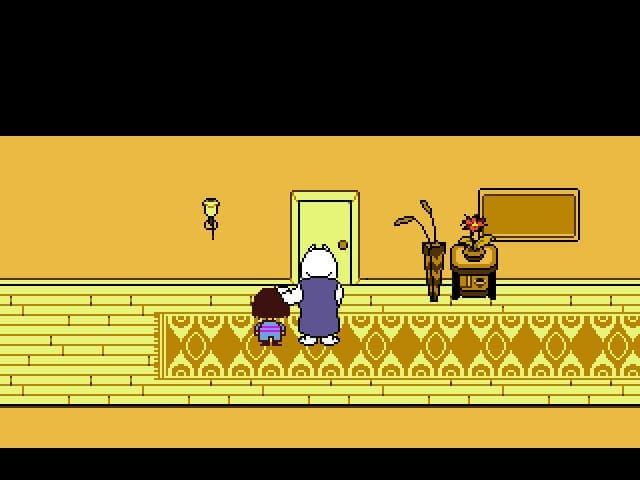
If I had to criticize something, I'd probably mention that some of the combat patterns later on in the game can get a bit grueling to complete, and this occurs no matter what ending you're on track to receive. I am not skilled at all with shoot-em-up gameplay, so I had to stock up on healing items to get through certain encounters, and I eventually did run out of funds. It's also worth mentioning that the game has a limited fast travel system, but there are certain areas that you might want to revisit for unique dialogue that will require wandering through empty rooms. Only completionists will feel that burden, but if you meet a favorite character in a dungeon, expect to have to walk back to them to hear what they have to say about current events.
Overall, Undertale moved me as both a reviewer of games and as a player. It toys with your interactions in its virtual world, preserving the illusion of the monster’s underground home as a real place above all else. It laughs along with you at the absurd gameplay tropes that we have all memorized and then rips its hand away as it thrusts you into heartfelt moments of character development. The fact that one developer was the primary creative force behind this endeavor is inspiring, and his work is fully realized as a masterpiece of storytelling that will live on for generations. Undertale is an instant classic that deserves to be appreciated in its time. Play this game.
TechRaptor reviewed Undertale on PC via Steam with a copy purchased by the reviewer.
Review Summary
Pros
- Storytelling Is Second To None
- Memorable Cast Of Characters
- Singular Experience You Won't Forget
- Puns
Cons
- Puns
Have a tip, or want to point out something we missed? Leave a Comment or e-mail us at tips@techraptor.net
